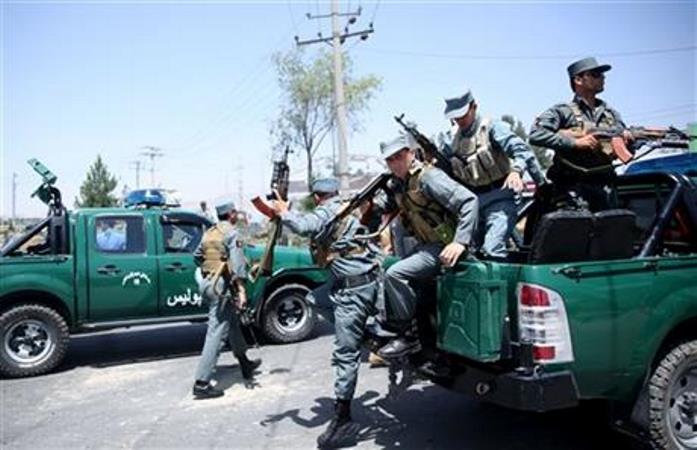
The Afghan president called on Pakistan on Monday to crack down on the Taliban after a suicide car bombing earlier in the day near Kabul's international airport killed five people, the latest in a wave of deadly attacks in the capital.
In a televised address, Ashraf Ghani also blamed neighboring Pakistan for what he described as Islamabad's support to the insurgents whose war against Kabul is now nearing its 14th year, and said he was sending a delegation to Islamabad later this week to demand a stop to this.
"We know they have sanctuaries there, we know they are active there," Ghani said, referring to Taliban leaders living in Pakistan. "We need all those activities to be stopped."
Since assuming office a year ago, Ghani has pursued closer relations with Pakistan, which wields influence over the insurgent group, hoping that it could use that influence to bring the Taliban into peace negotiations.
Pakistan, which has in the past denied supporting the Taliban, said it remains committed to maintaining good relations with Kabul and that after losing tens of thousands of its own people to terrorist attacks, it can feel the "pain and anguish of the brotherly people" of Afghanistan over the latest attacks there.
"Pakistan condemns these deadly attacks in Afghanistan in the strongest terms," said the Ministry of Foreign Affairs, adding that Pakistan will continue to support and facilitate an "Afghan-led and Afghan-owned peace and reconciliation process" with the Taliban.
Pakistan hosted the first official round of Kabul-Taliban negotiations last month, but a second round that was due at the end of last month was indefinitely postponed after the Afghan government announced the death over two years ago of the reclusive Taliban leader, Mullah Mohammad Omar.
The one-eyed Mullah Omar had hosted Osama Bin Laden's al-Qaida in the years leading up to the Sept. 11, 2001, attacks. He had not been seen in public since fleeing over the border into Pakistan after the 2001 U.S.-led invasion that ousted the Taliban. Since the announcement of his death, the Taliban have been torn by infighting and rivalries for the leadership post.
On Monday, Ghani appeared to take a step back on the peace talks.
"We don't want Pakistan to bring the Taliban to peace talks, but to stop the Taliban's activities on their soil," he said.
Only hours earlier, a suicide car bombing at a busy roundabout near the entrance to the Kabul airport killed at least five people and wounded 16, officials said. The Taliban quickly claimed responsibility for the attack.
The Kabul provincial police chief, Abdul Rahman Rahimi, told The Associated Press that a car packed with explosives blew up at the busy intersection.
Ghani also underlined his concerns in a telephone conversation Monday with U.S. Secretary of State John Kerry.
Kerry spokesman John Kirby said the two discussed the need of Afghanistan and Pakistan to eliminate safe havens for Taliban insurgents.
The attacks demonstrate the insurgency's "complete disregard for the lives of innocent Afghans," Kirby told reporters in Washington, saying the U.S. would work with Afghanistan and Pakistan to try to create a "stable, secure and prosperous region."
"Now is the time for the leaders of Afghanistan, Pakistan, to work together to achieve the shared goal of defeating violent extremists," he said. "It is in the urgent interest of both countries to eliminate safe havens and to reduce the operational capacity of the Taliban on both sides of the border."
Monday's suicide car bombing was the latest in a series of deadly attacks on the capital, which since Friday have killed more than 50 people and wounded hundreds.
The Taliban have claimed responsibility for all the attacks but one — a truck bomb explosion that flattened a city block, killed 15 people and wounded 240 as they slept in the early hours of Friday.
It is widely believed the truck in that attack detonated prematurely — CCTV footage shown on Afghan television purportedly showed the truck hitting a speed bump and then blowing up.
Earlier this month, the Afghan intelligence service disclosed that Mullah Omar had been dead for more than two years. The disclosure, later confirmed by the Taliban, triggered the internal succession dispute and raised questions about the future direction of the insurgency.
Ghani said the recent attacks showed "the war has changed shape."
"The enemy who was fighting to gain territory and claim victory, has now had its backbone broken," he said of the insurgent group. "It is so desperate now that it has turned to cowardly attacks against innocent people just to weaken people's morale."
